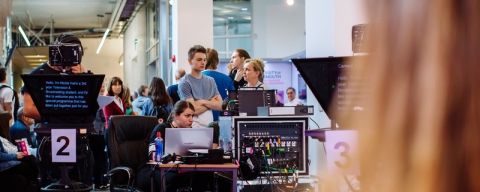
Key information
UCAS code:
P900
Typical offer:
112-120 UCAS points from 3 A levels or equivalent
Showing content for section Overview
Overview
Entertainment and information media now influence almost every part of our lives, while the emergence of global communication technologies has changed how we consume, create and share media across social, cultural, geographic, political and economic divides.
Set yourself up for a career as a global media professional capable of navigating this challenging yet exciting environment on this Global Communication and Media dual degree.
You'll study in Portsmouth and spend a year at Edith Cowan University in Perth, Western Australia.
Course highlights
- Discover how effective communication can contribute to a more tolerant and inclusive society
- Explore the latest professional techniques and methodologies used by national and international journalists, film directors, broadcasters and media professionals
- Use the latest digital technologies and facilities such as a fully equipped newsroom and broadcasting studios
- Learn from expert staff with industry-relevant experience who are engaged in research projects that analyse and inform the future of communication and media
- Boost your CV with opportunities to go on work placements and work on projects with local, national and global organisations
Why do a dual degree?
This course is a dual degree (also known as a double degree).
When you complete the course successfully, you'll have 2 degrees – one from the University of Portsmouth and one from Edith Cowan University.
Dual degrees allow you to achieve 2 degrees in 3.5 or 4 years rather than 6 years.
You'll benefit from a global education experience and the high-calibre teaching expertise, latest research and modern facilities at two universities. You'll also develop a more comprehensive knowledge of communication and media than on a single degree and gain an understanding of different cultures, which will help you work more effectively with people from different backgrounds.
All of this will help you stand out in a competitive job market after you graduate.
You'll be based in Portsmouth in years one and two, and for six months or a year at the end of the course. You'll spend year three in Perth, Western Australia at Edith Cowan University.
You'll get support with travel arrangements, visas, finding accommodation and accessing loans and other funding that can help pay for your study and living costs when you're in Australia.
Edith Cowan University is one of the top 100 young universities in the world one of the top 100 universities in the Asia-Pacific regions (Times Higher Education 2019 and 2020). The Good Universities Guide 2021 gives the University 5 out of 5 stars for its learner resources, student support, teaching quality and overall experience.
Like Portsmouth, Perth offers a mix of city and outdoor living. It's a great base for exploring Western Australia and beyond.
Focusing on your interests
You can shape your degree to your interests, strengths and career aspirations by choosing specific optional modules.
You'll graduate with one of the following exit awards alongside your BA Global Media and Communication degree from Edith Cowan University:
- BA (Hons) Global Communication and Media (Media and Journalism)
- BA (Hons) Global Communication and Media (Screen, Media and Cultural Studies)
What is a dual degree?
Learn about our dual degree programmes with Edith Cowan University in Australia.
Chris Chang: We have a strategic partnership with Edith Cowan University in Australia, particularly for students who have not travelled abroad or lived abroad, that gives them the opportunity to experience a dual degree. The design of our programmes means that we have developed the programme from the ground up, which doesn't require you to study that much more time for a degree programme.
Heather Massey: There's lots of reasons why people might want to come and study this dual award course at the University of Portsmouth. Learning in a different environment from different tutors and the facilities that they have at Edith Cowan are absolutely first-class.
Chris Chang: Students have the opportunity to travel for a year and the question that some students will have is "how will I be able to afford this?" Now the UK Government has launched the Turing programme and what this programme does is fund them to do study abroad, internships, placements. It makes it accessible to all students from different groups, whether they are international students or students from the UK.
Dr Sarah Reynolds: Experiencing life in a different country. You would mature and develop your confidence during that time and definitely walk out of the degree, I think standing up a bit taller than if you hadn't.
Chris Chang: Now the benefits of this is that you can actually show to employers that you have two degrees from two different universities in two different countries. Jobs these days have changed quite substantially. Your future job may not be in the UK and employers are looking for the kind of employees that are able to work in different contexts, different cultures be able to work in multidisciplinary and multinational teams.
One of the other benefits of this programme is that you can actually travel around, not just, Australia but around the ASEAN region because from Perth it's a very short flight to Hong Kong; to Singapore; to Malaysia.
Heather Massey: It's an amazing opportunity to learn both from experts in their field, but also learn about how different people in a different culture operate.
Chris Chang: There are inter-semester breaks of two-three months and you should use that opportunity to see the world. The other thing that you have is having studied a year abroad, you will make friends who could in the future be your supporters, be your allies, and be your collaborators of the future.
Dr Leah Fox: Even though they're geographically away. They'll still be able to get access to that same level of support as they were getting in Portsmouth. They'll have access to wellbeing, they'll have access to financial services, they'll have access to personal tutoring.
Chris Chang: These courses that we have delivered so far: Global Sport Management, Cybersecurity, Intelligence and Counter Terrorism, Environmental Science and Management are all in very specialist and niche areas. Means that wherever you end up working or living, you're prepared for it. The demand for these courses are high, so we want highly motivated students who will benefit from this programme and benefit from a year abroad.
Dr Leah Fox: We're looking for an applicant who wants to make a change, who is open minded and prepared to be confronted with a number of challenges. But overall, someone who is curious and wants to learn.
Contact information
Contact AdmissionsEntry requirements
BA (Hons) Global Communication and Media entry requirements
Typical offers
- A levels - BBB-BBC
- UCAS points - 112-120 points to include a minimum of 2 A levels, or equivalent. (calculate your UCAS points)
- T-levels - Merit
- BTECs (Extended Diplomas) - DDM-DMM
- International Baccalaureate - 25
You may need to have studied specific subjects – find full entry requirements and other qualifications we accept
English language requirements
- English language proficiency at a minimum of IELTS band 6.0 with no component score below 5.5.
See alternative English language qualifications
We also accept other standard English tests and qualifications, as long as they meet the minimum requirements of your course.
If you don't meet the English language requirements yet, you can achieve the level you need by successfully completing a pre-sessional English programme before you start your course.
We look at more than just your grades
While we consider your grades when making an offer, we also carefully look at your circumstances and other factors to assess your potential. These include whether you live and work in the region and your personal and family circumstances which we assess using established data.
Ideal skills and qualities for this course
In addition to meeting the course entry requirements and having an interest in the subject area, we're looking for the following skills and abilities:
- excellent communication and interpersonal skills
- problem-solving and decision-making ability
- a commitment to research and continuing professional development (CPD)
- ability to work under pressure and cope with stressful situations
- a critical and creative approach to work
- IT skills
We'll support you in developing these qualities further on the course.
Facilities and specialist kit
Eldon TV studios and CCI TV
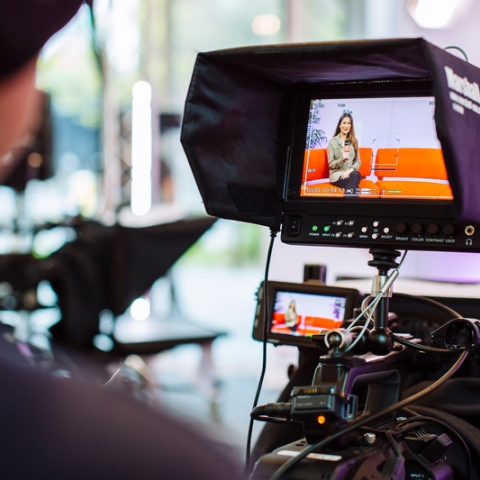
Newsroom
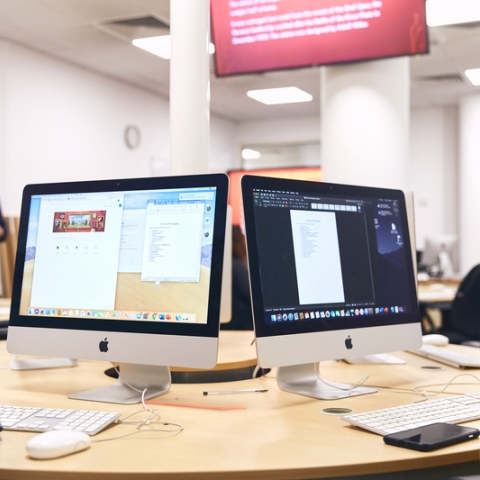
CCIXR
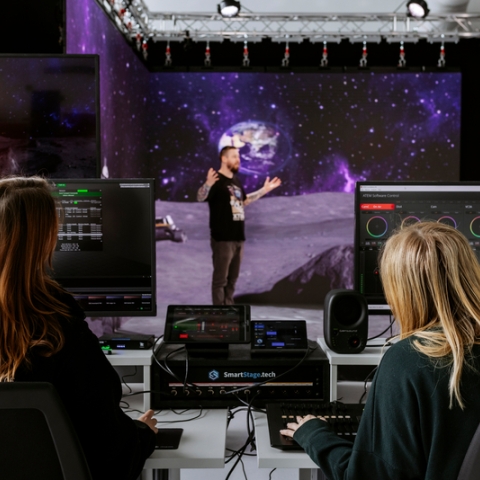
Open Access Suite

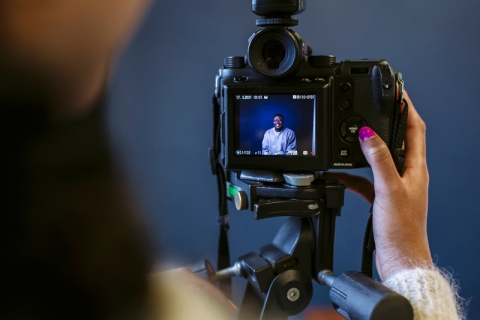
Equipment loan stores
Whatever your work, you can borrow computers and professional-standard film, photography, lighting, and performance equipment from our loan stores in the Faculty of Creative and Cultural Industries.
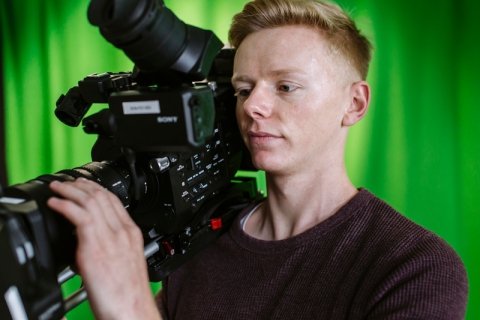
Professional TV and film cameras
Broadcast and film in crystal clarity with our range of industry-level Sony, JVC and Canon cameras.
Careers and opportunities
It's predicted the world’s entertainment and media sector revenue will grow to be worth more than $2.6 trillion by 2025 (PWC, 2021). This should create a significant demand for media and communications graduates.
When you complete this course, you'll have the knowledge and professional skills that will set you up for a career in media and communications in the UK and beyond, in public or private organisations or as a freelancer.
You could also use the communication, team working and research skills you develop in other sectors.
What areas can you work in with a global communication and media degree?
Areas you could work in include:
- journalism
- media research
- film and video production/direction
- scriptwriting
- broadcasting – scheduling, video editing, production management
- public relations
- marketing
- corporate communications
- advertising
You could also go on to postgraduate study, for example, by studying an MA or MRES.
Graduate destinations
Previous Portsmouth graduates have gone onto work for organisations such as:
- Sky
- Premier League Productions
- Disney UK
- Discovery UK
- Cosmopolitan
- Vogue
- BBC
- Channel 4
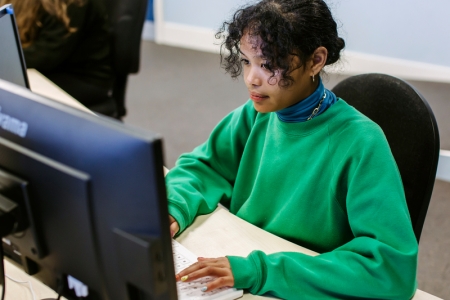
Ongoing career support – up to 5 years after you graduate
Get experience while you study, with support to find part-time jobs, volunteering opportunities, and work experience.
Towards the end of your degree and for up to five years after graduation, you’ll receive one-to-one support from our Graduate Recruitment Consultancy to help you find your perfect role.
Modules
Each module on this course is worth 15, 20 or 40 credits. You need to study modules worth 120 credits in years 1, 2 and 3, and study modules worth 60 credits in year 4.
Pathway options
You'll choose modules that match the award you graduate with from Edith Cowan University. You can choose between two awards:
- Media and Journalism
- Screen, Media, and Cultural Studies
You'll complete the same modules on both pathways in your first year, and specialise from your second year.
Your locations
In Years 1, 2 and 4, you'll be studying at the University of Portsmouth (UoP).
In Year 3, you'll be studying at Edith Cowan University (ECU) in Perth, Australia.
Media and Journalism pathway
You'll study at the University of Portsmouth in Year 1.
Core modules
Understanding your own skills, interests and motivations, you'll explore your future career decisions.
Insights from academics and professionals will inform your knowledge of required skills and qualities in creative tech. And you'll critically assess technological, ethical and commercial challenges and opportunities in contemporary film and TV.
On this module you will be introduced to the variety and complexity of global media texts, audiences and markets. From animation to webisodes, contemporary cinema to the impact of franchises in games, TV and film, the module will introduce you to the complexity - and enjoyment - of texts from across the globe.
The module is delivered through research specialists explaining the impact of global media, accompanied by directed study guides, readings and screening workshops in our dedicated Screening room. You will be encouraged to offer your thoughts and interpretations of texts through your interaction with each other, and in creating your own academic blog. By the end of the module, you will be confident in exploring global media markets, offering critical analysis of media texts, and in becoming a proficient researcher and communicator of ideas.
You'll explore influential schools of thought for understanding mass media, from the past to the present. Learn how to analyse media texts and understand our media-filled world through case studies and exercises. Guided by experienced lecturers, you’ll sharpen your critical thinking, research, and independent enquiry skills.
By the end, you'll have the essential knowledge and tools to start your journey as a media scholar, ready to explore deeper questions. Let this module set your curiosity ablaze as you explore the power and possibilities of media.
You’ll look into big topics, from regulation to digital disruption, and think critically about journalism. Analysing the relationships between journalists, audiences, and power, you’ll appreciate influences on reporting.
Gain the essential background to thrive as a journalist with this module, which covers ethics, laws, theories, and practical skills.
By getting into current issues and discussions, you’ll be ready to make work that really matters and keeps the public informed.
You’ll look at reporting limits and defenses in different sectors, gaining an understanding of how to ethically report while considering the public interest.
Study important legal decisions and self-regulation in the media to learn how to give advice on the best conduct in complex legal scenarios.
This course will equip you with the knowledge you need to navigate your professional life in an ever-evolving industry.
You’ll improve your ability to spot news and write creatively by working on assignments with real deadlines. Discover how to uncover engaging stories, find the best angles, and make facts interesting with your writing. Master methods for creating attention-grabbing headlines and catchy social media posts.
In our simulated newsroom, you'll learn to discover stories and adapt your reports for different audiences and markets. Understand the legal and ethical rules that journalists follow. Put together a strong portfolio of your published work, showing off all your reporting skills.
By the end of this module, you’ll have the expertise and professional work to succeed as a journalist today. Let your dedication to truth guide you as you uncover and share the stories that count.
In year 2 you'll study at the University of Portsmouth.
Core modules
You’ll write sharp reviews and features, and make editorial decisions for different audiences across various media.
By looking at writing styles and revenue metrics, you’ll learn how to create content that really connects with people.
You’ll also explore research methods, helping you to put together a persuasive media research proposal.
This experience will boost your creativity and analytical skills. By the end, you’ll be ready for jobs where you can use storytelling to unlock new opportunities.
You’ll learn to shoot and edit stories ready for mobile platforms, enhancing your ability to work in the field.
Reflecting on content creation aligned to platform strengths, you’ll be able to use data-led strategies to better engage with audiences.
You’ll finish this module with the essential skills you need to succeed in contemporary journalism.
Optional modules
You’ll look at how new technologies are changing political communication and giving more people a voice. Discuss the good and bad points: is social media bringing people together or dividing them?
Look into social movements and how people are using the internet to push for change. Study real-life examples of how political parties and leaders use (or don’t use) online tools. Get a solid understanding to judge what people say about the digital era. Learn to use critical theories to figure out technology’s role in running a country. Improve your ability to explain what digital media means for democracy to many people.
By the end of this module, you’ll be ready to join in on the conversation about how the internet is changing democracy.
You’ll consider how the news presents important events such as wars, disasters, and emergencies, and reflect on the impact of reporting. Dig into how news is made and think deeply about the forces that shape reporting on human rights. By studying real examples and doing your own research, you’ll learn to apply complex ideas to your analyses.
You’ll come to see the important role journalism has in society and learn how to cover world issues responsibly. Be a part of important talks on how the media deals with human rights — discussions that could lead to real change.
By analysing global case studies, you’ll assess how journalism prioritises sensational stories over peaceful resolutions during war. You’ll scrutinise the political and societal impacts of media coverage that favours violence and engage in discussions about this bias, forming your well-researched viewpoints.
This module invites you to consider how ethical journalism can transform the way we understand global discord.
You’ll join in on simulated newsdays, working in teams to plan, research, and make professional multimedia content. Lead your team and improve your skills as you cover live events. Excel in digital tools to tell stories with text, pictures, audio, and video. Learn to make quick, smart decisions when you’re up against tight deadlines. Think deeply about the legal and ethical issues journalists deal with today.
This module gives you the advanced multimedia techniques, teamwork, and vital skills you need to thrive in journalism.
You will learn about key concepts and approaches to create compelling and authentic stories. You will also learn how to show reality while being critically aware of ethical practices. Additionally, you will get hands-on experience filming on location by finding stories, interviewing people involved, and collaborating with others to shape your ideas.
Throughout the module, you will gain knowledge on every aspect of creating a documentary, from start to finish. By studying different documentary styles and storytelling contexts, you will be able to make a powerful documentary that showcases your skills.
At the end of the module, you will have honed your skills and gained a deep understanding of the genre, allowing you to pursue creative documentary projects with confidence.
You’ll create a unique magazine for a specific niche and study the media environment. This will help you gain a competitive edge in everything—from branding to circulation.
Working as part of an editorial team, you’ll take on real industry roles, crafting engaging issues that perfectly blend concept, content, and visual excellence.
This practical experience is a solid base for coming up with ideas and producing magazines that truly stand out in the market.
You’ll study evolving reporting methods and audience interactions and suggest strategies suitable for new digital trends.
By looking at research on online communities, public discussion, and how people consume news on the internet, you’ll assess what these shifts mean for professional journalism—a field increasingly shaped by openness and audience involvement.
You'll complete your third year at Edith Cowan University (ECU) in Perth, Australia.
You'll study the same core modules in year 3 on both pathways.
Core modules
- Audience Perception and Experience - 15 credits
- Industry and Community - 15 credits
- Media, Identity, and Social Justice - 15 credits
- Personal and Professional Planning - 15 credits
Optional modules
- Convergent Digital Newsroom - 15 credits
- New Media and Social Influence - 15 credits
- Photojournalism and Editorial Practice - 15 credits
- Screen Practice 2: Factuals and Formats - 15 credits
- Visual Storytelling - 15 credits
- Audio Storytelling - 15 credits
- Global Communications - 15 credits
- Investigative Journalism - 15 credits
- Media in Asia - 15 credits
You'll complete your fourth year at the University of Portsmouth.
Core modules
You’ll create a practical research proposal, carefully assess sources to form insightful questions, and explore potential solutions.
By using ethical analysis methods, you’ll contribute to the advancement of knowledge in your specialised field. You’ll also improve your academic writing skills.
You can expect a challenging yet rewarding experience as you take your impactful project from idea to completion.
Optional modules
You’ll look at how new technologies are changing political communication and giving more people a voice. Discuss the good and bad points: is social media bringing people together or dividing them?
Look into social movements and how people are using the internet to push for change. Study real-life examples of how political parties and leaders use (or don’t use) online tools. Get a solid understanding to judge what people say about the digital era. Learn to use critical theories to figure out technology’s role in running a country. Improve your ability to explain what digital media means for democracy to many people.
By the end of this module, you’ll be ready to join in on the conversation about how the internet is changing democracy.
You’ll consider how the news presents important events such as wars, disasters, and emergencies, and reflect on the impact of reporting. Dig into how news is made and think deeply about the forces that shape reporting on human rights. By studying real examples and doing your own research, you’ll learn to apply complex ideas to your analyses.
You’ll come to see the important role journalism has in society and learn how to cover world issues responsibly. Be a part of important talks on how the media deals with human rights — discussions that could lead to real change.
Screen, Media, and Cultural Studies pathway
You'll study at the University of Portsmouth in Year 1.
Core modules
Understanding your own skills, interests and motivations, you'll explore your future career decisions.
Insights from academics and professionals will inform your knowledge of required skills and qualities in creative tech. And you'll critically assess technological, ethical and commercial challenges and opportunities in contemporary film and TV.
On this module you will be introduced to the variety and complexity of global media texts, audiences and markets. From animation to webisodes, contemporary cinema to the impact of franchises in games, TV and film, the module will introduce you to the complexity - and enjoyment - of texts from across the globe.
The module is delivered through research specialists explaining the impact of global media, accompanied by directed study guides, readings and screening workshops in our dedicated Screening room. You will be encouraged to offer your thoughts and interpretations of texts through your interaction with each other, and in creating your own academic blog. By the end of the module, you will be confident in exploring global media markets, offering critical analysis of media texts, and in becoming a proficient researcher and communicator of ideas.
You'll explore influential schools of thought for understanding mass media, from the past to the present. Learn how to analyse media texts and understand our media-filled world through case studies and exercises. Guided by experienced lecturers, you’ll sharpen your critical thinking, research, and independent enquiry skills.
By the end, you'll have the essential knowledge and tools to start your journey as a media scholar, ready to explore deeper questions. Let this module set your curiosity ablaze as you explore the power and possibilities of media.
You’ll look into big topics, from regulation to digital disruption, and think critically about journalism. Analysing the relationships between journalists, audiences, and power, you’ll appreciate influences on reporting.
Gain the essential background to thrive as a journalist with this module, which covers ethics, laws, theories, and practical skills.
By getting into current issues and discussions, you’ll be ready to make work that really matters and keeps the public informed.
You’ll look at reporting limits and defenses in different sectors, gaining an understanding of how to ethically report while considering the public interest.
Study important legal decisions and self-regulation in the media to learn how to give advice on the best conduct in complex legal scenarios.
This course will equip you with the knowledge you need to navigate your professional life in an ever-evolving industry.
You’ll improve your ability to spot news and write creatively by working on assignments with real deadlines. Discover how to uncover engaging stories, find the best angles, and make facts interesting with your writing. Master methods for creating attention-grabbing headlines and catchy social media posts.
In our simulated newsroom, you'll learn to discover stories and adapt your reports for different audiences and markets. Understand the legal and ethical rules that journalists follow. Put together a strong portfolio of your published work, showing off all your reporting skills.
By the end of this module, you’ll have the expertise and professional work to succeed as a journalist today. Let your dedication to truth guide you as you uncover and share the stories that count.
In year 2 you'll study at the University of Portsmouth.
Core modules
Learn about the influence of TV, movies, ads, online platforms, and newspapers in the US, Canada, and Ireland. Understand how these outlets build a sense of who we are. You’ll develop key research skills to delve into the media’s cultural role.
You’ll get to watch films, listen to lectures, and work on a detailed project. This will help you learn ways to study identity, assess media in context, and create your own studies on how national stories affect our identity.
This module will equip you with the ability to critically evaluate the media’s role in forming national identity and give you the tools to conduct your own research into this complex process.
You’ll trace the development of film, TV, and digital media, grasping historical impacts and the concept of spectatorship. Look into expert analyses to explore how interactive technologies shape audiences and people. You’ll contextually analyse screen entertainment as an industry, considering economic factors and passive vs active engagement. Through a mix of practical and theoretical work, your projects will showcase your in-depth understanding of the subject. You’ll also evaluate online materials to support your findings.
By the end, you’ll have a well-rounded understanding of screen culture. You can use this to pursue many careers, from media programming to content creation.
Optional modules
You'll learn about the creation and production of films for the global market by developing scripts and pitching ideas. Additionally, you'll also gain a business perspective by understanding scheduling, budgeting, and funding.
During the module, you'll discover the various roles on set to understand the production process better. Furthermore, you'll learn about safety procedures and paperwork to ensure that best practices are followed.
This module is a comprehensive guide, covering both the creative and business sides of the international film industry.
You will get the opportunity to study classic and modern stories from different genres, including crime and flash fiction, which will help you learn about literary styles. Moreover, you will practice writing for different age groups, such as adults, young adults, and children, and adapt your writing style accordingly.
Throughout the module, you will turn your ideas into complete stories and develop a portfolio of your work. You will also get the chance to improve your creative process through discussions and self-assessment. In addition, you will experience the publishing world by pitching a story to a magazine.
By the end of the module, you will have discovered your unique storytelling voice and created captivating short fiction.
You will have access to advanced cameras and editing software to create your own projects, collaborate with your peers and review each other's work.
Furthermore, you will learn about industry safety procedures, the relationship between ideas and techniques, and explore your creativity by participating in this filmmaking experience.
Analysing diverse screen languages and conventions, you'll enhance your creativity, and comparing story structures and narrative needs of global production will broaden your perspective. You'll learn to understand target audiences and emerging platforms, to prepare you for working a the global marketplace.
With script drafting and redrafting practice, you'll gain industry-applicable writing talents. Through acclaimed script analysis, you'll appreciate what makes great screenwriting.
In this module, you’ll study how film has evolved and look at today’s challenges. These will help you think about creativity from a justice-focused perspective.
This broad approach will give you a clearer view of the ethical guidelines that professionals follow in different fields.
With greater critical understanding and ethical duties, you’ll be equipped to make wise career choices, leading with empathy.
You’ll explore emerging technologies to understand how the internet, social media, and ambient media shape—and are shaped by—human behaviour. Consider expert opinions to spark discussions about online communities and the idea of an ‘information society.’ We’ll show you how to find trustworthy sources online, helping you delve into the participation culture across platforms.
By making your own digital content, you’ll learn about the impact of what people create and share in our always-connected world. Crucially, by taking part, you’ll improve your ability to use different media platforms and develop your creativity, preparing you for jobs in today’s digital-first workplace.
This module provides an opportunity to put media theory into practice as you develop and shoot your own narrative project.
You will learn how to manage your time effectively, progress from concept to final edit, and analyse your creative decisions and cinematic storytelling.
This experience is invaluable for anyone looking to plan and produce a film from start to finish.
You’ll choose learning tasks that add up to 60 hours, like internships, volunteering, research, or remote study that match your career plans. Workshops will help you make meaningful goals and think about what you’ve accomplished. Through this, you’ll grow the knowledge, skills, and qualities you need to thrive in the workplace.
By looking at your growth through active participation and reading, you’ll become a perceptive, eager job-seeker who stands out.
You’ll look at how some media stories use more than one platform, like books, films, games, and more. Discover how transmedia has changed over time and how to make your own stories more immersive and interactive. You’ll work with others to create and present your own transmedia project.
This module will help you become a skilled transmedia storyteller, ready for the industry. You’ll also improve your teamwork and research skills by collaborating with others. Most of all, your creativity will bloom as you immerse yourself in the future of interactive storytelling.
You'll complete your third year at Edith Cowan University (ECU) in Perth, Australia.
You'll study the same core modules in year 3 on both pathways.
Core modules
- Audience Perception and Experience - 15 credits
- Industry and Community - 15 credits
- Media, Identity, and Social Justice - 15 credits
- Personal and Professional Planning - 15 credits
Optional modules
- Convergent Digital Newsroom - 15 credits
- New Media and Social Influence - 15 credits
- Photojournalism and Editorial Practice - 15 credits
- Screen Practice 2: Factuals and Formats - 15 credits
- Visual Storytelling - 15 credits
- Audio Storytelling - 15 credits
- Global Communications - 15 credits
- Investigative Journalism - 15 credits
- Media in Asia - 15 credits
You'll complete your fourth year at the University of Portsmouth.
Core modules
You’ll create a practical research proposal, carefully assess sources to form insightful questions, and explore potential solutions.
By using ethical analysis methods, you’ll contribute to the advancement of knowledge in your specialised field. You’ll also improve your academic writing skills.
You can expect a challenging yet rewarding experience as you take your impactful project from idea to completion.
Optional modules
Research from diverse lenses to build a questioning, reflective grasp of celebrity's principles and boundaries. Hone skills in independent thought, analysis, and articulation of ideas. Use presentations to illustrate arguments around the societal role of fame.
Be part of editorial teams and assume real industry roles. You’ll manage everything, from package production to scheduling engaging programs within tight deadlines.
You’ll also have the chance to reflect on your personal growth through team-based creative work. Improve your technical abilities and learn how to develop content strategies for your intended audience.
This module is an excellent way to get ready for a career in the dynamic world of broadcasting.
Changes to course content
We use the best and most current research and professional practice alongside feedback from our students to make sure course content is relevant to your future career or further studies.
Therefore, course content is revised and regularly reviewed. This may result in changes being made in order to reflect developments in research, learning from practice and changes in policy at both national and local levels.
Teaching
Teaching methods on this course include:
- lectures
- seminars
- workshops
You'll also experience "flipped learning". This is where you're introduced to the learning material before the teaching session and then deepen your understanding through discussion with peers and problem-solving activities, facilitated by lecturers.
Many of the teaching staff are from relevant journalism, media and film industry backgrounds and have worked as journalists, news producers, researchers, film directors, film editors, factual and documentary filmmakers, multimedia specialists cinematographers and other relevant roles.
You can access all teaching resources on Moodle, our virtual learning environment, from anywhere with a Web connection.
How you're assessed
- practical assessments
- video, blog and infographic submissions
- essays
- portfolios
- oral presentations
You'll be able to test your skills and knowledge informally before you do assessments that count towards your final mark.
You can get feedback on all practice and formal assessments so you can improve in the future.
How you'll spend your time
One of the main differences between school or college and university is how much control you have over your learning.
We use a blended learning approach to teaching, which means you’ll take part in both face-to-face and online activities during your studies. As well as attending your timetabled classes you'll study independently in your free time, supported by staff and our virtual learning environment, Moodle.
A typical week
We recommend you spend at least 35 hours a week studying for your dual degree.
In your first year, you'll be in timetabled teaching activities, such as lectures, seminars, tutorials, practical classes and workshops for about 18 hours a week. The rest of the time you’ll do independent study such as research, reading, coursework and project work, alone or in a group with others from your course. You'll probably do more independent study and have less scheduled teaching in years 2, 3 and 4 but this depends which modules you choose.
Most timetabled teaching takes place during the day, Monday to Friday. You may occasionally need to go to University and course events in the evenings and at weekends.
Term times
The academic year at University of Portsmouth runs from September to early June with breaks at Christmas and Easter. It's divided into 2 teaching blocks and 2 assessment periods:
- September to December – teaching block 1
- January – assessment period 1
- January to May – teaching block 2 (includes Easter break)
- May to June – assessment period 2
You'll finish your final year in December.
The academic year at Edith Cowan University runs from February to November with breaks at Easter and in June. It's divided into 2 semesters and 2 exam periods:
- February to May – semester 1 (includes Easter break)
- June – exam period 1
- July to October – semester 2
- November – exam period 2
You'll start year 3 at ECU in semester 2 in July, finishing in semester 1 in May.
Where you'll study (Year 3)



Supporting you
The amount of timetabled teaching you'll get on your degree might be less than what you're used to at school or college, but you'll also get support via video, phone and face-to-face from teaching and support staff to enhance your learning experience and help you succeed. You can build your personalised network of support from the following people and services:
Types of support
You'll have a personal tutor from the University of Portsmouth and a country link tutor from Edith Cowan University when you're studying in Perth in year 3.
Your personal tutors help you make the transition to independent study and give you academic and personal support throughout your time at university.
You'll have regular contact with them in learning activities or scheduled meetings. You can also make an appointment with them if you need extra support. They'll be available virtually in year 3 when you're in Australia.
You'll have help from a team of faculty academic skills tutors. They can help you improve and develop your academic skills and support you in any area of your study.
They can help with:
- improving your academic writing (for example, essays, reports, dissertations)
- delivering presentations (including observing and filming presentations)
- understanding and using assignment feedback
- managing your time and workload
- revision and exam techniques
As well as support from faculty staff and your personal tutor, you can use the University's Academic Skills Unit (ASK).
ASK provides one-to-one support in areas such as:
- academic writing
- note taking
- time management
- critical thinking
- presentation skills
- referencing
- working in groups
- revision, memory and exam techniques
Our online Learning Well mini-course will help you plan for managing the challenges of learning and student life, so you can fulfil your potential and have a great student experience.
You can get personal, emotional and mental health support from our Student Wellbeing Service, in person and online. This includes 1–2–1 support as well as courses and workshops that help you better manage stress, anxiety or depression.
If you require extra support because of a disability or additional learning need our specialist team can help you.
They'll help you to
- discuss and agree on reasonable adjustments
- liaise with other University services and facilities, such as the library
- access specialist study skills and strategies tutors, and assistive technology tutors, on a 1-to-1 basis or in groups
- liaise with external services
Library staff are available in person or by email, phone, or online chat to help you make the most of the University’s library resources. You can also request one-to-one appointments and get support from a librarian who specialises in your subject area.
The library is open 24 hours a day, every day, in term time.
If English isn't your first language, you can do one of our English language courses to improve your written and spoken English language skills before starting your degree. Once you're here, you can take part in our free In-Sessional English (ISE) programme to improve your English further.
Course costs and funding
Tuition fees
All fees may be subject to annual increase.
UK students
- Years 1 and 2 – £9,250 a year
- Year 3 – £1,385
- Year 4 – £4,625
EU students
Fees include Transition Scholarship.
- Years 1 and 2 – £9,250 a year
- Year 3 – £1,385
- Year 4 – £4,625
International students
- Year 1 – £17,200 a year
- Year 2 – to be confirmed
- Year 3 – to be confirmed
- Year 4 – to be confirmed
Funding your studies
Find out how to fund your studies, including the scholarships and bursaries you could get. You can also find more about tuition fees and living costs, including what your tuition fees cover.
Applying from outside the UK? Find out about funding options for international students.
Additional course costs
These course-related costs aren’t included in the tuition fees. So you’ll need to budget for them when you plan your spending.
Additional costs
Our accommodation section shows your accommodation options and highlights how much it costs to live in Portsmouth.
You’ll study up to 6 modules a year. You may have to read several recommended books or textbooks for each module.
You can borrow most of these from the Library. If you buy these, they may cost up to £60 each.
We recommend that you budget £75 a year for photocopying, memory sticks, DVDs and CDs, printing charges, binding and specialist printing.
If your final year includes a major project, there could be cost for transport or accommodation related to your research activities. The amount will depend on the project you choose.
You'll need to cover your living costs and pay additional costs of £3,000–£4,000 to cover travel to and from Australia in year 3. You can cover these costs using a UK Government student loan.
We can advise you on travel arrangements, visas, finding accommodation and accessing a student loan that can help pay for your study and living costs when you're in Australia.
Apply
How to apply in the UK
To start this course in 2024, apply through UCAS. You'll need:
- the UCAS course code – P900
- our institution code – P80
If you'd prefer to apply directly, use our online application form.
Don't worry if you change your mind about studying abroad after you start the course. It's easy to transfer to a similar course once you're at Portsmouth or study this course as a single degree if you decide not to attend Edith Cowan University in Year 3.
You can also sign up to an Open Day to:
- Tour our campus, facilities and halls of residence
- Speak with lecturers and chat with our students
- Get information about where to live, how to fund your studies and which clubs and societies to join
If you're new to the application process, read our guide on applying for an undergraduate course.
Applying from outside the UK
As an international student you'll apply using the same process as UK students, but you’ll need to consider a few extra things.
You can get an agent to help with your application. Check your country page for details of agents in your region.
Find out what additional information you need in our international students section.
If you don't meet the English language requirements for this course yet, you can achieve the level you need by successfully completing a pre-sessional English programme before you start your course.
Admissions terms and conditions
When you accept an offer to study at the University of Portsmouth, you also agree to abide by our Student Contract (which includes the University's relevant policies, rules and regulations). You should read and consider these before you apply.
